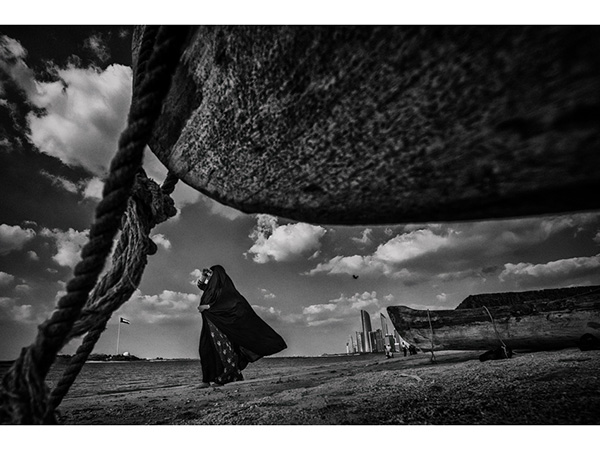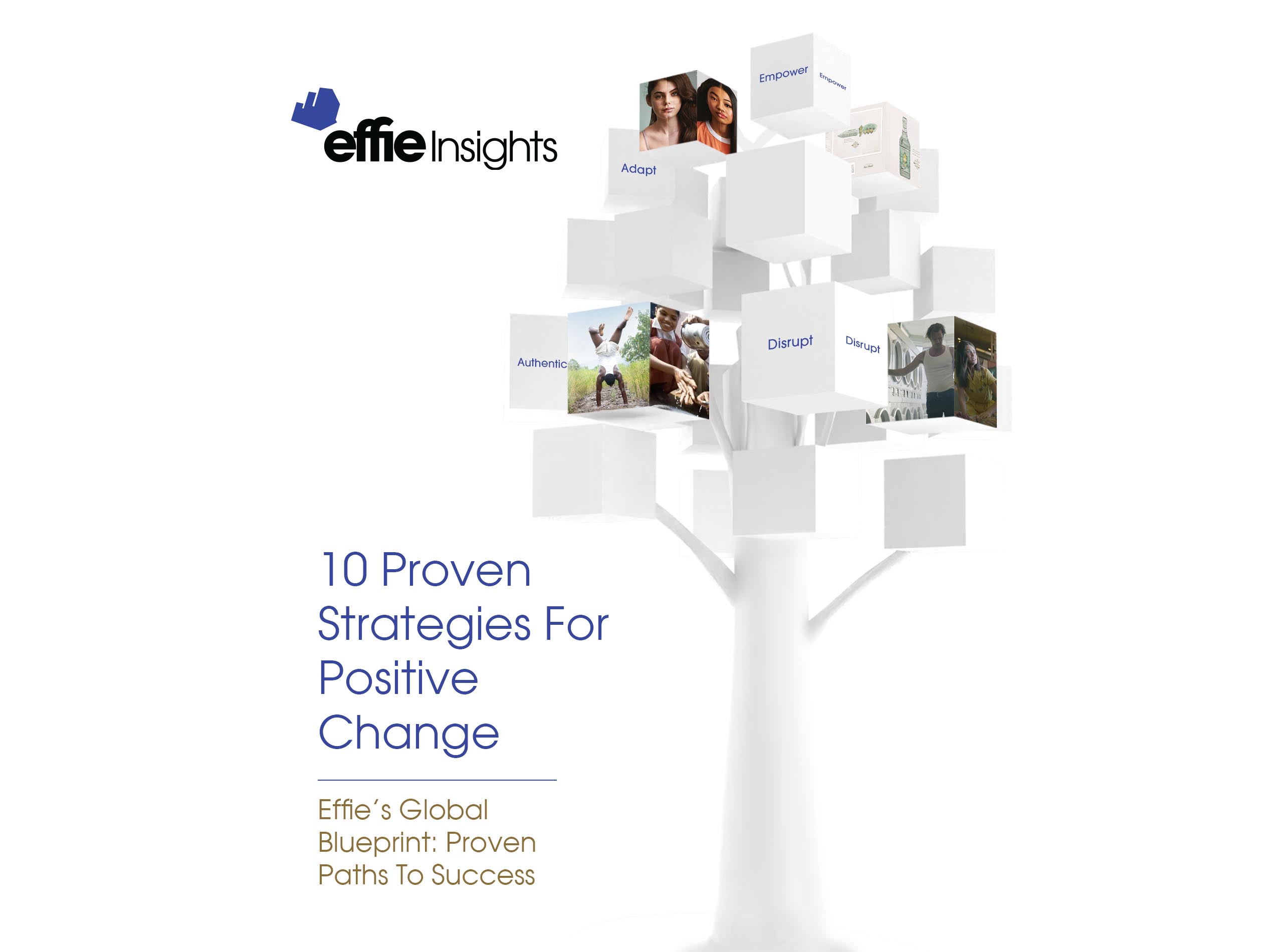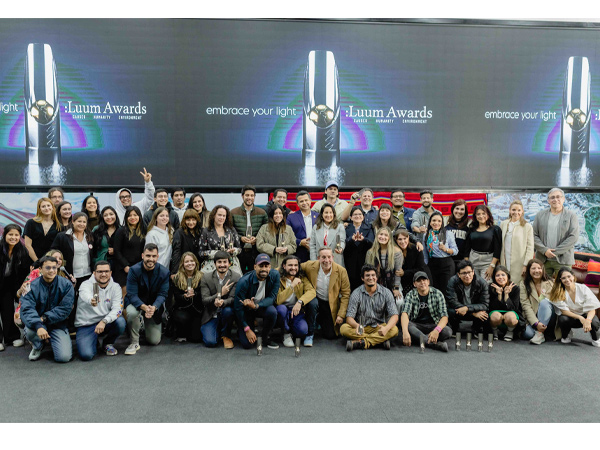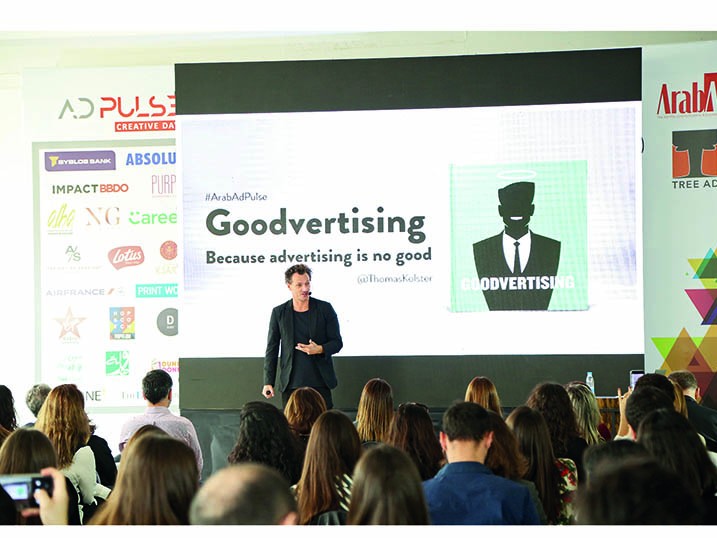News - Events
Goodvertising, Design for Good, Tolerance… Inspiring Topics Tackled at ArabAd's AdPulse Creative Day
by ArabAd staff
November 30, 2018

The first session was led by Thomas Kolster, author of Goodvertising, the most comprehensive book to date exploring communication for good and Director of the Goodvertising Agency. For the man who has coined the word Goodvertising, clearly his lecture revolved around the introduction of this new reality.
In a radical transparent world there’s no room for self-serving brands, an enthusiast and genuine Kolster explained that the communication industry has a pivotal role to play in promoting a more sustainable mindset and behaviour and that by making advertising better we can make the world better. As a matter of fact, he said that 80% of customers globally say they want to buy from companies that are positively impacting the world around them. However, only 6% believe the companies they do business with are actually good. Moreover, he insisted that it’s not about being good rather brutally better. Today Kolster says brands must be bold, solve stuff and think business models like a Warren Buffet on speed. If need be, “hire a farmer-invite differences inside. Marry your clients or simply care!”
Kolster gave examples of forward thinking brands including local ones like Byblos Bank and Absolut Vodka, brands that are tapping into the emotions of people on what really matters like the environment, plastic pollution, diversity and gender equality – through genuine acts of social good and note mere marketing ploys that associate a brand with feel-good campaigns. These brands have led purposeful and impactful campaigns and are living up to their purpose, turning challenges into success stories, leaving a mark on people and increasing their profit.
Without purpose, hence no meaning and no potential for brands.
He stressed on the importance of brand value and brand trust. He mentions a pertinent quote from Larry Fink, CEO of BlackRock who said: “Without a sense of purpose, no company, either public or private, can achieve its full potential. It will ultimately lose the license to operate from Key stakeholders.” Kolster is obviously on a mission to transform communications professionals into marketing activists, so advertising turns into something better, simply because he cares and he wants everyone of us to care.
The second lecture of the day tackled Personal Branding and was delivered by Jimmy Ghazal, founder of Beirut-based Mindlab, a creative, business and innovation based consultancy, working on enhancing brand experiences and perceptions.
Titled “It’s not how good you are but how well you are perceived”, Jimmy’s keynote stressed mainly on the fact that the challenge for brands is not selling services and products but rather enhancing and amplifying the perception of the brand. “It is not what you say, it is how you say it; it is not what you do it is how you do it,” Jimmy explained, emphasizing on the importance of perception. Social media concepts, tips and tricks were discussed, adding on how a person is also an ambassador of their own brand where a person and the brand are two faces to the same coin.
Thomas Kolster presented a hands on practice workshop on “How to Future Proof Your brand and Unlock Genuine Shared Value.” The workshop seated the participants on round tables to facilitate hands on group work, exercises and discussions on his earlier introduced concept of Goodvertising, building further into the criteria and characteristics of a valued brand with purpose – a purposeful brand. Different brands were analyzed for their “Goodvertising.” Different solution examples and impactful ideas were brainstormed and presented in relation to brands’ values and how these in turn create brand trust. The ultimate objective was to show attendees how marketers are successfully moving away from marketing at people and rather creating genuine watercooler conversations and putting forward solutions to issues that really matter to people.
The fourth session of the day was about Graphic Design as a Social Commentary. This lecture was presented by Mirko Ilic, one of the most acclaimed designers alive today who has previously served as art director for the international edition of Time magazine and the New York Times Op-Ed pages. Mirko presented the value of freedom and how designers used their skills and graphic visuals to depict their dissent. By showcasing several posters and art pieces based on the book ‘Design of Dissent’, which he co-authored with Milton Glaser, Mirko discussed and shed light on the poignant message of defiance these visuals portray by addressing pressing topics such as war, poverty, racism, humans rights, environmental protection, and gun control to name a few. He focused on the powerful ability of graphic design to visually drive social change and the artists’ responsibility to use their skills for good and how they can impact social change through graphic design and art.
The day full of remarkable lessons, takeaways and a great atmosphere of learning and connecting to drive a positive impactful change in the world was all planned inside an art exhibit curated by Mirko Ilic himself on Tolerance. The posters have been traveling around the globe, with prominent international designers adding their handprint in reinterpreting the concept of tolerance - portraying it through the eyes of their mind - at each stop along the way.
The day ended with the announcement of the winners of Arabad Poster Design Contest where regional artists and designers were asked to add their own visual take on the idea of Tolerance.
The Tolerance Poster Show was the cherry on top to a fruitful and thought-challenging day. Speak about an intellectual purposeful event at a time where inclusivity is cherished more than ever.
Topics
Recommended

Donell Gumiran announced as UAE's winner for the Sony World Photography Awards 2025

Effie celebrates ten years of championing campaigns that make a difference

Edelman and Ogilvy star at the Luum Awards, the global festival for purpose-driven communications

















